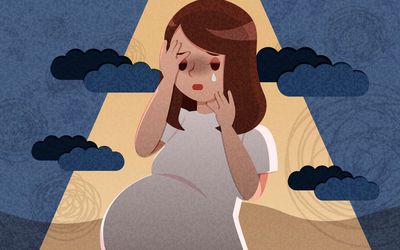Women with epilepsy experience more anxiety and depression symptoms during and after pregnancy than other women, according to a new study led by researchers at Stanford Medicine.
The study was published online on Aug. 17 in Neurology, the medical journal of the American Academy of Neurology. The study, which tracked more than 300 women with epilepsy during and after their pregnancies, expanded researchers’ knowledge of how epilepsy interacts with mental health conditions. Scientists already figured out that having epilepsy puts people at greater risk for depression, and vice versa, more likely to happen because of the overlap in the brain networks involved in the two disorders. Pregnancy and the postpartum period are also well-known triggers of depression and anxiety. But the intersection of all three states — pregnancy, epilepsy, and mood disorders — were poorly understood.
“We found that women with epilepsy have increased risk for mood and anxiety disorders during pregnancy,” said Kimford Meador, MD, professor of neurology at the Stanford School of Medicine. “This makes it more important to monitor their well-being while they are pregnant.”

Meador shares lead authorship of the study with Zachary Stowe, MD, of the University of Wisconsin at Madison.
It is said that the metabolism of anti-seizure drugs speeds up during pregnancy, which can leave patients with much less medication circulating in their blood than usual. Dosage adjustments are needed to prevent breakthrough seizures — and the new study adds protection to patients’ mental health, to some reason, this is prudent since more seizures were found, and having more seizures was linked to the risk for experiencing major depression during pregnancy.
Tracking mental health
Here is how the process was done:
The study, conducted at 20 epilepsy centers across the United States, included 331 women with epilepsy who were recruited during the first half of pregnancy and followed until nine months after birth. Researchers also recruited two control groups: 102 healthy pregnant women, and 102 non-pregnant women with epilepsy who took part in the study for the same length of time.
Participants completed questionnaires assessing their symptoms of depression and anxiety six times, once every three months during pregnancy and the first nine postpartum months. Those with high scores on depression questionnaires were assessed for a current major depressive episode using a more detailed, structured interview.
Participants reported their age, marital status, education level, household income, whether their pregnancy was planned, whether they had ever been diagnosed with a mood or anxiety disorder, and whether they were using antidepressant medication. Women with epilepsy also reported the anti-seizure medication(s) that they were using and the frequency and severity of their seizures.
Although the proportion of women who met formal criteria for major depression did not differ between groups, pregnant women with epilepsy had more and worse depression symptoms. This was true when they were compared with non-pregnant women with epilepsy throughout the study.
Pregnant women with epilepsy also had worse postpartum depression symptoms than healthy pregnant women. Among pregnant women with epilepsy, taking multiple anti-seizure medications at once and having more than one seizure every 90 days — both indications of more severe epilepsy — as well as having a lifetime history of mood disorders and having an unplanned pregnancy were all linked to greater risk for a major depressive episode during the study.
Pregnant women with epilepsy also had worse anxiety symptoms than both control groups at all time points within the study. In both groups of pregnant women, anxiety symptoms decreased after giving birth. Higher anxiety scores and lifetime history of a mood disorder were also linked to greater risk of suicidal ideation, although suicidal ideation was infrequent in all groups and did not differ significantly between groups of participants.

The findings emphasize the need for mental-health screening and care throughout pregnancy and the postpartum period. However, women with epilepsy should feel reassured that with the right care, they can have successful pregnancies, Meador said, adding that medical knowledge regarding epilepsy and pregnancy has improved significantly since the first half of the 20th century, when women with epilepsy were discouraged from becoming pregnant.
Ideally, women with epilepsy can work with their doctors before becoming pregnant to ensure they are taking an anti-seizure medication that is safe for pregnancy, and can receive care for anxiety or depression if needed via such treatments as cognitive behavioral therapy or antidepressant medications. A few antidepressants, such as bupropion, marketed as Wellbutrin, are poor options in epilepsy because they lower the seizure threshold, Meador noted, but most antidepressants can be taken safely by people with epilepsy.
“Women with epilepsy are at some increased risk for problems during pregnancy,” Meador said. “But with good health care, the large majority will have a normal pregnancy and a normal child.”
Meador is a member of Stanford Bio-X, the Stanford Maternal and Child Health Research Institute, and the Stanford Wu Tsai Neurosciences Institute.
The research was funded by the National Institutes of Health, the National Institute of Neurological Disorders and Stroke, and the Eunice Kennedy Shriver National Institute of Child Health and Human Development (grant U01-NS038455).
Scientists from Emmes Company, the University of Southern California, Brigham & Women’s Hospital, Harvard Medical School, Northwestern University, Minnesota Epilepsy Group, Emory University, the University of Cincinnati, and the University of Pittsburgh also contributed to the research.
What needs to be done is to take pregnancy seriously and certain authorities have to provide the services needed in order for a woman to be mentally and physically healthy during and after her pregnancy.
https://med.stanford.edu/news/all-news/2022/08/depression-epilepsy-pregnancy.html


